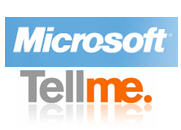Microsoft's speech aspirations fulfilled?

Microsoft and Bill Gates have been in pursuit of speech technologies for a long time, and news.com is reporting that it may end up buying Tellme Networks for a pretty price (the company has received $230 million in funding so far and is profitable).
Speech input has been the next big interface thing from Microsoft for at least a decade, but few mainstream users are giving speech commands to their Windows computers, telling it to "open file," "close window" or take a letter. According to GigaOm, Microsoft may pay $800 million or more for Tellme's speech technology.

You have to wonder about the effectiveness of all the money Microsoft has spent on speech technology R&D over the years if the company ends up acquiring Tellme for hundreds of millions.
Of course, Microsoft is not lacking in cash for such transactions, and views this kind of technology as core to its mobile and communications aspirations, and its Speech Server business. Microsoft's speech products group is centered around its speech recognition software for Vista and Speech Server for handling speech-enabled telephony and speech-enabled applications.
In 1998, Microsoft hired top speech recognition technologist Kai Fu Lee, and was a founder of Microsoft Research Asia, and then lost him to Google in a much publicized battle in 2005.
Microsoft Research has speech tech teams in Redmond and Beijing working on spoken language technologies with a vision of the "fully speech-enabled computer." Check out the marketing flash demo explaining Microsoft speech recognition ambitions and research activities, which focus on continuous free flowing speech and ways to obtain cleaner signals for computing input in public places by sensing vibrations in skin.
More from Techcrunch and WSJ ($)